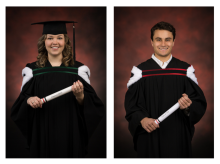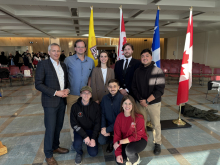A new international study led by McGill University in collaboration with Jefo Nutrition shows that supplementing dairy cow diets with microencapsulated B-vitamins can significantly reduce greenhouse gas emissions while increasing milk yield and quality. The use of the feed additive cut global warming potential, an internationally standardized measure of climate impact, by up to 18 per cent across seven countries.


A McGill University-led research team has demonstrated the feasibility of a sustainable and cost-effective way to desalinate seawater. The method – thermally driven reverse osmosis (TDRO) – uses a piston-based system powered by low-grade heat from solar thermal, geothermal heat and other sources of renewable energy to produce fresh water.

In her presentation at a scientific symposium hosted by Agriculture and Agri-Food Canada's Sherbrooke Research and Development Centre in June, McGill Ph.D. candidate Anjaly Paul highlighted the potential for Canadian farms to significantly reduce greenhouse gas emissions while generating renewable energy, by converting agricultural waste into biogas.

McGill Bioresource Engineering Professor Michael Ngadi called for urgent action to address the challenges facing stallholder farmers in Nigeria at a recent public lecture at the Michael Okpara University of Agriculture Umudike (MOUAU).
A specialist in developing advanced emerging technologies for monitoring and controlling agrifood processing systems, he discussed the critical role that smallholder farmers and processors play in global food systems, particularly in developing and transition countries.

As McGill’s Class of 2025 prepares to cross the stage, the 10 valedictorians from Faculties across the University—including Andre Hadji-Thomas and Jennifer McDonald in the Faculty of Agricultural and Environmental Sciences—have been drafting their speeches and, in the process, reflecting on much more than their academic success.

In a recent article, La Presse investigates whether boycotting American products could improve our health. Experts interviewed for the article said it's possible—but only if we change other eating habits in the process.

On March 27, McGill honoured 141 laureates at the 20th annual Bravo Gala, celebrating researchers who received prestigious provincial, national or international awards in 2024, including eight researchers in the Faculty of Agricultural and Environmental Sciences.
In his opening remarks, McGill President and Vice-Chancellor, Deep Saini, applauded the honourees for their efforts, underlining the importance of McGill’s research contributions.

The presence and concentration of PFAS, also known as "forever chemicals," in fertilizing residual materials will be monitored under new standards in Quebec through a management code, according to Quebec's Environment Ministry.
Quebec's code on the management of fertilizing residual materials such as sewage sludge, also known as biosolids—which come from treating municipal or industrial wastewater—will take effect Nov. 1.
The code takes into account a total of 13 types of substances and includes monitoring guidelines.

The Government of Canada recently announced an investment of over $1 million in three freshwater projects for the protection of Lake Simcoe, including $412,700 to McGill University to demonstrate and evaluate best management practices to reduce phosphorus runoff from urban and agricultural sources in the Lake Simcoe watershed and to engage the community through outreach and events.

A company founded by Department of Bioresource Engineering James McGill Professor Michael Ngadi has succeeded in developing HyperEye, a new technology that uses hyperspectral imaging and AI to quickly and non-invasively identify the sex of a chick before it hatches.

The Department of Bioresource Engineering (BREE) enjoyed a visit last month from David Saint-Jacques, astronaut and Deputy Director, Lunar Exploration at the Canadian Space Agency, and BREE graduate Chris Patterson. They met with BREE undergrad and grad students who presented their projects, highlighting links between their research and bioregenerative life support system goals for extended space missions on the lunar surface and beyond in the near future.

McGill Bioresource Engineering Professors Valérie Orsat and Vijaya Raghavan spoke to Le Devoir about their recent study, which found that better educating farmers and food processors about how to avoid post-harvest food losses would reduce global food insecurity.

In 1974, Chandra Madramootoo arrived at Macdonald Campus to pursue his BSc in Agricultural Engineering. He never left.
“I loved the program. I loved the professors. I loved my courses,” said Madramootoo. “It was giving me exactly what I wanted in life. I was fulfilling a dream.”
After also earning his MSc (1981) and his PhD (1985) at Mac, he accepted an 11th hour offer from McGill for an assistant professorship, declining opportunities at other universities.

On November 11, McGill University Bioresource Engineering Professor Zhiming Qi received the L.R. Ahuja Ag Systems Modeling Award at the annual Soil Science Society of America conference in San Antonio, Texas.
This prestigious honour is awarded by the American Society of Agronomy, Crop Science Society of America, and Soil Science Society of America to a soil scientist, agronomist, or crop scientist in recognition of recent distinguished contributions and their demonstrated impact on:

Almond milk, oat milk, coconut milk, rice milk, macadamia milk... there have never been so many options to replace cow's milk on grocery shelves. But which one has the smallest environmental footprint?
